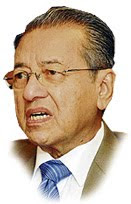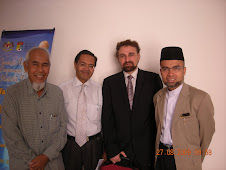Saturday June 27, 2009
Reality check on economic models
What Are We To Do
By TAN SRI LIN SEE-YAN
SINCE the 1970s, mainstream research on major macroeconomic issues (growth and inflation, booms and busts, etc) were grounded in individual behaviour. The best and brightest in the field became Nobel laureates (for example, Robert Lucas and George Akerlof).
The results were rigorous indeed, the macroeconomic models are certainly that. Their roots date back to Professor Irving Fisher (Keynes’ contemporary), who determined behaviour of the market in rational, mathematical terms.
But policy makers and the public want them to be illuminating and useful – that is, realistic. What we got was anything but that. To begin with, the idea of finding a single theory encompassing all of human behaviour was not realistic.
What emerged was based on the “efficient market” hypothesis – that everyone acts rationally and have perfect information so that the market accurately prices the real value of “goods” transacted. Concepts like equity, ethics and values are regarded as sloppy sociological constructs.
In the real world, however, much of what brings about business opportunities and causes instability in the global economy, results from the failure of assumptions such as these. Indeed, herd behaviour, panic, asset mispricing, imperfect information and irrational exuberance have resulted in the mess we now witness.
The arrogance of it all is that these models claim to have solved the problem of instability. Admittedly, there could be periodic recessions, but no gigantic collapse. Whatever happens is predictable and can be handled; indeed, precautionary steps can be taken to prevent them.
How wrong they were! Sure enough, the intellectual edifice fell into disrepute in the summer of ‘08. What’s unsettling is that the current crisis has not fitted into any of the standard models about business cycles. Nor has it submitted to textbook solutions.
Mostly, they failed to point out fundamental weaknesses of financial markets. They could not foresee such a major crisis. Now, they quarrel on appropriate policies, and on the likely course of future events.
What’s stark is the contrast between the real economy that produces goods and services, and the financial intermediation markets in securities, banking, mutual funds and other services.
The causal relationship between them still remains a mystery, as is the solution. The puzzle remains because this crisis originated in very frightened financial markets with their toxic products.
Minsky’s challenge
Looking back, it was Hyman Minsky (a mid-20th century economist) who confronted conventional theory and argued that the financial system played a big role in exaggerating the business cycle.
This is so because (i) investors, banks, consumers extrapolate the future as though it is like the recent past; and (ii) after a period of stable growth, they develop a misguided confidence that such benign conditions will continue.
This led them to borrow more (and banks to lend more in the face of accommodating easy money), thus raising the riskiness of the system’s collapse.
At this stage, it doesn’t take much change in the fundamentals on investor attitudes to cause the system to unravel. Once prices start to drop, the downward cycle rapidly collapses.
Minsky’s challenge to blind faith in free markets offers an important lesson: If markets are not always right, then Wall Street’s vested interest needs to be vigorously challenged, however loudly they may complain. One thing is clear: I do not believe in the market’s self-healing ability.
Markets don’t have all the answers
Even before the crises, there were already strong hints that a hands-off approach by government was not the only way to manage an economy. Sure, Russia’s past was not a good example. But China’s government-managed capitalism appears to be doing fine.
The modern financial system as we know it from history originated from a series of innovations in 17th century Netherlands. Dutch finance and ideas eventually crossed the English Channel and built the stock market, financed global trade and established the Bank of England, the nucleus of Anglo-Saxon capitalism.
When the British system failed, the centre crossed the seas once again. New York and Washington replaced London and Amsterdam. Its modern version runs the world today. The Dutch introduced version 1.0 around 1620; the British, 2.0 in about 1700; and the US set up version 3.0 in 1945.
As an operating system, it did work pretty well most of the time. Not everyone shared the benefits and there are environmental and social costs to rapid progress.
But the system has a built-in tendency to crash. Since the Dutch tulip bubbles in 1637, the system was prey to excesses. Now, we have the great unravelling – easily one of the worst.
Liberal capitalism has proved to be risky, unequal and destabilising. When things go wrong, the less powerful often pay a high price. Ask the Russians or the Argentinos.
No question, the system as we know it now needs to be de-bugged. We are in the midst of its current evolution. We are, in a sense, still in unknown territory, facing new situations and taking measures not tried before.
As I see it, now more than ever, version 4.0 in 2009 has to be one in which the needs of the many come before the greed of the few.
Even in crisis, some form of capitalism remains favoured. Private enterprise, competition and consumer choice will need to continue as the key drivers.
That’s still the best way to allocate and price goods and services. But there should also be a better way to regulate, monitor and police the orderly conduct of financial services. We know only too well the market no longer has all the answers.
Risk and morals
In economics, technology has become king with an impact not unlike that of the benevolent Prometheus. Morality adapted to its demands.
Faith in the market – the midwife of technological innovation – was a result of this.
Debt became a factor to be leveraged (a metaphor from engineering), thus turning “getting into debt” (by being highly leveraged) into something desirable. In contrast, the virtuous Chinese savers are being castigated for failing in their “duty” to spend more, and not less.
According to Lord Skidelsky, Keynes’ noted biographer, the key in the transition to a debt-fuelled economy was the re-definition of uncertainty as risk. Whereas managing uncertainty was traditionally a moral matter, hedging against risk became regarded as just a legitimate technical issue.
This in practice abolished the need for moral concerns. Hence, the active deployment of quants (mathematical whiz kids) to develop new risk-free instruments (getting the sting out of debt) that confronted the barriers of prudence and self-restraint.
These “merchants of debt” (as Minsky called them) offered a full range of risk preferences. Because growing competition steadily drove down the cost of risk, the future became (theoretically at least) virtually risk-free!
As we know it now, this brought the world onto the edge of complete disaster. It is now up to the evolving reformed regulatory framework to re-establish moral responsibility back to where it belongs, without the comfort of moral-hazard-rescue by governments.
Darwin’s offer: Be a beetle
A hundred and fifty years ago, Darwin’s The Origin of Species for the first time detailed how evolutionary selection operated through the survival of the fittest.
The lesson for us lies in Darwin’s recognition that extinction is an integral part of evolution. Similarly, adverse macroeconomic conditions reduce the survival chances of enterprises in the same way that bad weather limits biodiversity.
Viewed positively, the demise of weak ventures can – and do – lead to creative destruction (a la Schumpeter), with capital being re-allocated to more productive areas.
For Darwin, the species that are most responsive to change will survive.
This precludes us from selecting the more macho eagles and bears as worthy exemplars. Though noble and smart, they are collectively endangered. In reality, there is only one evolutionary superstar left on offer – the ever adaptable humble crawler, the beetle!
·A former banker, Dr Lin is a Harvard-educated economist and a chartered scientist (London) who now spends time promoting the public interest. Feedback is most welcome at email:
starbizweek@thestar.com.my.
Subscribe to:
Post Comments (Atom)







































No comments:
Post a Comment